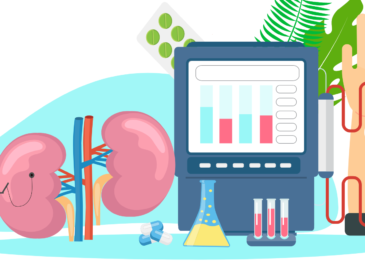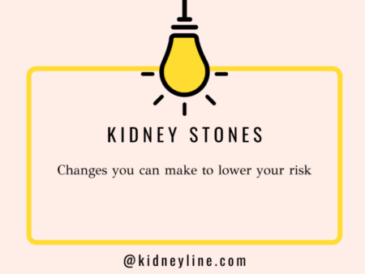Chronic kidney disease (CKD) is a serious health condition affecting millions worldwide. It is a long-term condition in which the kidneys gradually lose function over time. The symptoms and complications of CKD will likely affect a person’s quality of life.
CKD is a silent killer. It often goes unnoticed until it is in its advanced stages. Early detection and treatment of CKD is crucial to prevent further kidney damage and reduce the risk of complications. With proper treatment, you may be able to slow the disease and reduce symptoms.
Overview of the Functions of the Kidneys
The kidneys are a pair of bean-shaped organs located in the lower back. The kidneys filter waste products, excess fluids, and toxins from the blood. Additionally, they help regulate blood pressure, produce hormones that stimulate the production of red blood cells, and maintain the body’s electrolyte balance.
The kidneys remove waste by filtering approximately 200 liters of blood each day. That is the equivalent of 400 pints of blood. These waste products get excreted from the body in the form of urine.
The kidneys also play a crucial role in regulating the body’s fluid balance. They are responsible for maintaining the right amount of fluids in the body, which helps to prevent dehydration and maintain normal blood pressure.
The kidneys produce several hormones, including renin and erythropoietin. Renin helps to regulate blood pressure, while erythropoietin stimulates the production of red blood cells in the bone marrow.
The kidneys are also responsible for maintaining the body’s electrolyte balance. Electrolytes are minerals in the body that help regulate various bodily functions, including muscle and nerve functions. The kidneys help to maintain the right balance of electrolytes in the body, which is essential for overall health and wellbeing.
Definition and Causes
Chronic Kidney Disease (CKD) is a condition that occurs when the kidneys are damaged and cannot filter blood properly. This can lead to a buildup of waste and fluid in the body, which can cause a range of health problems. By definition, this kidney dysfunction should have lasted for at least 2 months.
Various factors, including high blood pressure, diabetes, infections, chemicals, structural abnormalities and certain genetic conditions can cause CKD.
Stages of Chronic Kidney Disease
CKD is divided into five stages, with stage 1 being the mildest and stage 5 being the most severe. There may be no symptoms in the early stages, but as the disease progresses, symptoms can include fatigue, nausea, and swelling in the legs and feet. Treatment options vary depending on the stage of CKD and the underlying cause.
| Stage | Description | GFR* |
| Stage 1 | Very mild kidney damage with normal or increased GFR | >=90 |
| Stage 2 | Mild kidney damage with mildly decreased GFR | 60-89 |
| Stage 3 | Moderate kidney damage with moderately decreased GFR | 30-59 |
| Stage 4 | Severe kidney damage with severely decreased GFR | 15-29 |
| Stage 5 | Kidney failure with very little or no GFR | <15 |
*GFR stands for glomerular filtration rate, a measure of kidney function.
Signs and Symptoms
The symptoms of CKD can vary depending on the stage of the disease. In the early stages, there may be no symptoms at all. As the disease progresses, symptoms and signs can include
- High blood pressure
- Swelling in the legs, ankles, feet, or face
- Shortness of breath
- Feeling tired or weak
- Muscle cramps
- Itching
- Loss of appetite
- Nausea and vomiting
- Dry skin
- Difficulty sleeping
- Changes in urine output or color
- Drowsiness
- Seizures
- Loss of consciousness
Diagnosis of chronic kidney disease
Diagnosis of CKD typically involves a combination of blood tests, urine tests, and imaging tests such as ultrasounds or CT scans. Serum creatinine, a blood test, estimates how well your kidneys filter blood (glomerular filtration rate). Urine tests check for albumin or protein in the urine.
These are not the only tests your doctor will request. You will likely be asked to do additional tests to help determine the cause of the kidney disease and the presence of complications.
Treatment Options
Medications
Medications are usually prescribed to slow the disease and manage the symptoms and complications of chronic kidney disease. These medications include:
- ACE inhibitors and ARBs to control blood pressure and protect the kidneys
- Diuretics to remove excess fluid from the body
- Erythropoietin to stimulate the production of red blood cells
- Phosphate binders to control the level of phosphorus in the blood
- Vitamin D supplements to maintain bone health
- Sodium-glucose cotransporter 2 inhibitors can help with albumin in urine and blood sugar control
Dietary Changes
Dietary changes are also an essential part of managing chronic kidney disease. You may be advised to:
- Limit protein intake to reduce the workload on the kidneys
- Limit sodium intake to control blood pressure and reduce fluid retention
- Limit potassium intake to prevent hyperkalemia
- Avoid foods high in phosphorus to prevent bone disease
- Avoid foods high in oxalate to prevent kidney stones

Dialysis
Dialysis is a treatment that uses a machine to filter waste products and excess fluid from the blood when the kidneys can no longer do so. There are two types of dialysis:
- Hemodialysis, which uses an artificial kidney machine to filter the blood
- Peritoneal dialysis, which uses the lining of the abdomen to filter the blood
Kidney Transplant
A kidney transplant is a surgical procedure in which a healthy kidney from a donor is transplanted into a patient with chronic kidney disease. If you get a kidney transplant, you will need to take medications to avoid rejecting the kidney. Although kidney transplants are effective treatments, finding a suitable donor can be challenging.
Complications of CKD
Cardiovascular Disease
CKD can lead to an increased risk of cardiovascular disease, including heart attacks and strokes. This is because the kidneys play a crucial role in regulating blood pressure, and when they are damaged, blood pressure can rise. High blood pressure can damage blood vessels and increase the risk of heart attacks and strokes.
Anemia
Another complication of chronic kidney disease is anemia, which occurs when the kidneys are no longer able to produce enough red blood cells. Anemia can cause fatigue, weakness, and shortness of breath.
Bone Disease
Chronic kidney disease can also lead to bone disease, as the kidneys play a crucial role in regulating calcium and phosphorus levels in the body. When the kidneys are damaged, these levels can become imbalanced, leading to bone disease, including osteoporosis and osteomalacia.
Nerve Damage
Finally, chronic kidney disease can also lead to nerve damage. This can cause numbness, tingling, weakness in the hands and feet, and other symptoms.
If you have CKD, you need to work closely with your healthcare team to manage symptoms and other potential complications.
Prevention
Preventing chronic kidney disease involves managing the risk factors that can lead to the development of the disease. Here are some steps that can be taken to reduce the risk of developing chronic kidney disease:
- Control blood sugar levels: High blood sugar levels can damage the kidneys, so it is crucial to keep blood sugar levels under control.
- Control blood pressure: High blood pressure can also damage the kidneys, so it is vital to keep blood pressure under control.
- Quit smoking: Smoking can damage blood vessels and worsen kidney function, so quitting is essential.
- Exercise regularly: Regular exercise can help maintain a healthy weight and reduce the risk of diabetes and high blood pressure.
- Eat a healthy diet: A balanced diet low in salt, sugar, and fat can help prevent high blood pressure, diabetes, and obesity.
- Avoid excessive use of painkillers: Overusing painkillers such as ibuprofen and aspirin can damage the kidneys, so it is important to use them only as directed.
It is also important to get regular check-ups with a healthcare provider, especially if there is a family history of kidney disease or other risk factors present. By taking these steps, you can reduce the risk of developing chronic kidney disease and maintain good kidney health.




